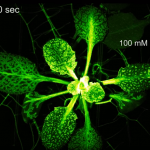Definition
noun
(1) The measure of the amount of a sub-component (especially solute) in a solution
(2) The ratio of the mass or volume of a substance (solute) to the mass or volume of the solvent or solution
(3) The increase of strength of a pharmaceutical preparation
(4) The act or process of focusing or fixing of attention
(5) The product of something concentrated
Supplement
In biochemistry, the term concentration refers to the measure of the amount of a sub-component in a solution. For instance, the concentration of a solute in a solution pertains to the ratio of the mass or volume of the solute to the mass or volume of the solvent. The concentration of the solute can be measured by chemical means, e.g. by evaporation of the solvent, diffusion, or purification.
In pharmacology, the term concentration refers to the strength of a pharmaceutical preparation. The concentration of a pharmaceutical preparation can be done by extraction, precipitation and drying of the crude active agent.
Related term(s):
- Concentration cell
- Concentration gradient
- Concentration-effect curve
- Critical concentration
- Mean corpuscular haemoglobin concentration
- Minimal inhibitory concentration
- Peak plasma drug concentration
Related form(s):







